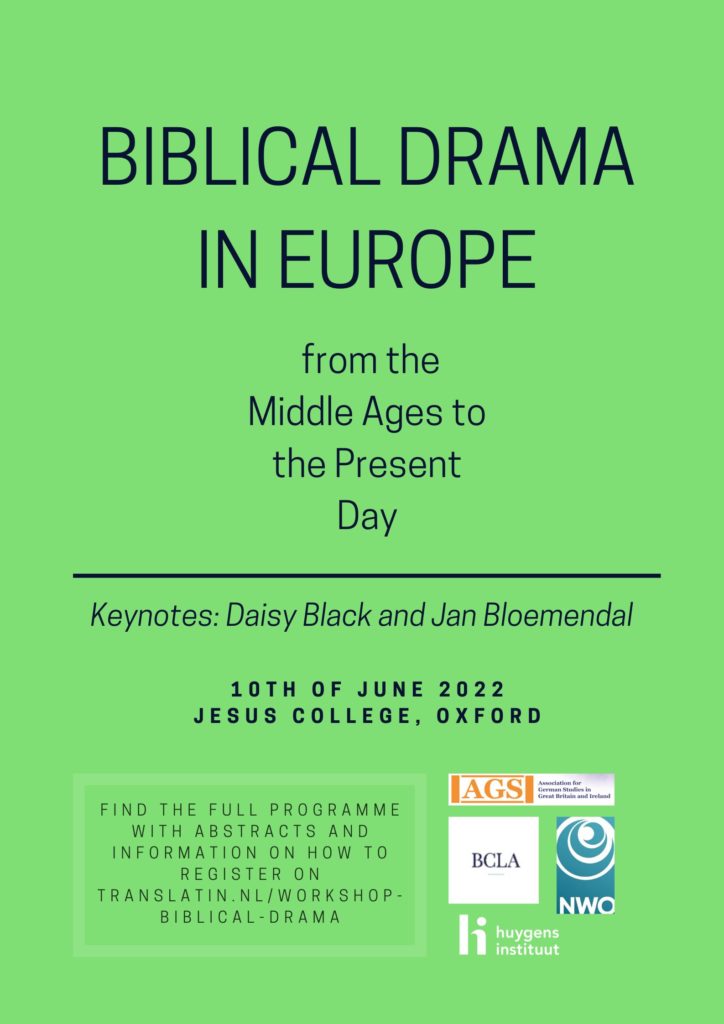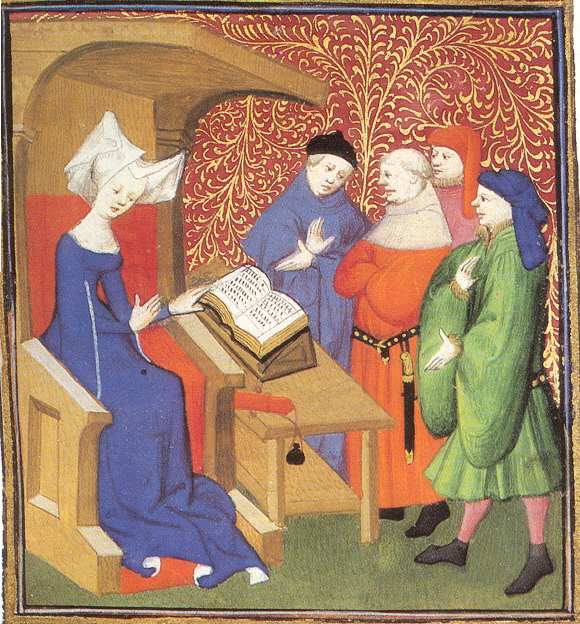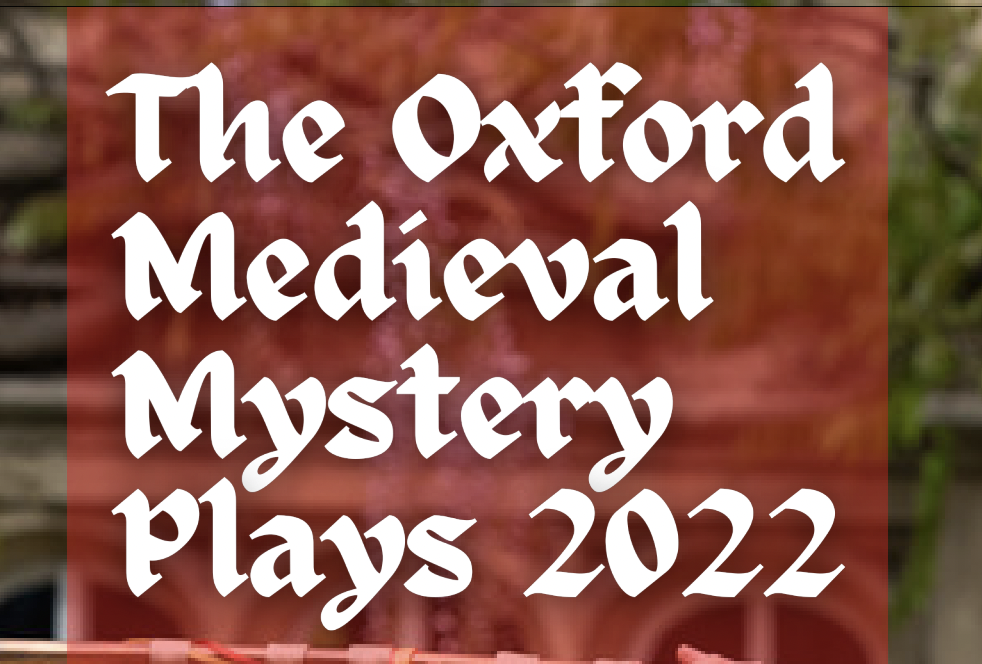For the full programme of the workshop with abstracts cf. https://translatin.nl/workshop-biblical-drama/
Organisers: Dr Dinah Wouters (Amsterdam), Sarah Fengler (Oxford)
Liturgical drama in the Middle Ages starts by adapting the most cherished texts of European culture: Scripture. Once introduced as a common practice of dramatising the Bible, European drama kept producing scriptural plays. While there was a strong German tradition of medieval mystery plays, the history of biblical drama is by no means limited to the German cultural sphere. New formats and modes of biblical drama developed through the centuries and in different language areas: from French mystery plays, humanist sacred comedies and tragedies, Jesuit Bible drama, and Spanish Golden Age autos sacramentalesthrough to neoclassical biblical tragedy, biblical Trauerspiele in the German Empfindsamkeit, and scriptural plays in English Romanticism. Furthermore, there was a rediscovery of the so-called cycle plays during the nineteenth century, and even today biblical narratives are still being staged, from modern and postmodern biblical plays through to Broadway and movies. A large number of writers from various eras debated the question of how Scripture can be dramatised, including Hugo Grotius, Jean Racine, Friedrich Gottlieb Klopstock, Voltaire, George Gordon Byron, and Pier Paolo Pasolini, to name but a few.
In this workshop, we want to explore the continuities, (in)consistencies, and break lines in the history of European biblical drama. Our objective is to come closer to a diachronic, transnational, and comparative perspective on biblical drama as a literary genre.
Programme
09.00-09.30 Arrival with coffee and tea
09.30-09.45 Opening words
09.45-10.45
Keynote by Daisy Black (University of Wolverhampton)
Hole-y Bodies: Exploring gender in the textual gaps of medieval and modern biblical drama
One of the key challenges with the diverse texts collected into the asynchronous structure we call ‘the Bible’, is that these scriptures are fundamentally ‘holey’ as well as holy. By nature of their compilation, form and function, they present us with holes in the text, holes in the narrative, and holes in characterisation. Such holes seem to frustrate the process of dramatization, in which divine stories and beings must be given body, direction and story. Meanwhile, the mere act of staging scripture entails its own issues of embodiment, threatening to expose the aching gap between venerated or divine figures and the bodies representing them. Yet for generations of those seeking to dramatize scripture, both scriptural and physical ‘holes’ have also presented opportunities: gaps through which contemporary concerns might be expressed, explored, rationalised and raised in protest. This is particularly the case in the staging of narratives involving women, whose scriptural origins tend to be even more ‘holey’ than those of male figures. Using English-language case studies from the medieval, early modern and modern periods, this paper examines how playmakers across time have grappled with gaps, and used them to give voice and body to ideas about gender and how we choose whose stories are told.
10.45-12.15 Panel 1
Tovi Bibring (Bar-Ilan University and University of Oxford)
Disciplining Emotions in The Mystery Play, Le mistere du Viel Testament as a Case Study
Written by several authors, the 45 mysteries that were compiled in the fifteenth century in an opus referred to as Le mistere du Viel Testament are not merely an “encyclopedia of sacred knowledge, traditions and legends,” as labeled by their modern editors. They are also an important source for understanding the history of emotions in medieval and early modern times. Yet, despite the fact that literary research on the subject has developed greatly over the past years, influenced by the discipline of history of emotions, biblical adaptations in general, and biblical drama in particular, remain quite neglected. Scriptural narratives left enormous lacunas regarding the psychological outcomes of the events experienced by the biblical protagonists. Like any genre of biblical literary adaptation, the different mysteries contained in Le mistere thus provided fertile soil for speculative amplifications about such emotional states. Authors and dramaturges alike could “recontextualize” the psychological implications of any biblical episode in their contemporary setting, and, quite judgmentally, direct the audience toward a supervised formation of their emotions. Such texts thus played a double role, simultaneously constructing the emotional discourse and evaluating it, instructing the audience whether to accept or reject it. In my presentation, I would like to demonstrate the means by which such biblical adaptations acted as an agent to disciplining emotions, according to this double role. Aspiring particularly towards the theorization of the specific contribution of the biblical mystery play to the emotive discourses, I will show the similarities and differences between the mysteries and other genres that perform this literalization of the imagined emotional consequences of the biblical material, such as devotional and didactic texts and parodies.
Cecily Fasham (University of Oxford)
Teaching Faith: Performing Pedagogy in the Jeu d’Adam
The Jeu d’Adam represents the earliest extant script for a drama in French or a vernacular language of England. Although the single extant manuscript, MS Tours 927, dates from the late 12th century and was copied in the Loire valley, it is written in Anglo-Norman dialect, and orthographic evidence suggests that its Occitan-speaking scribe struggled with his earlier copytext’s unfamiliar language.
The play has an episodic structure, dramatizing Adam and Eve’s fall from Eden, followed by Cain’s murder of Abel, and a procession of prophets largely adapted from the Pseudo-Augustinian Sermo contra Judeos, Paganos, et Arianos, which includes a debate between Isaiah and a Jew. The Jeu d’Adam has traditionally been viewed as a ritual drama, emerging from liturgy and the performative ceremonies of church services; my paper explores interconnections between the play and contemporary pedagogical practices, building on Christophe Chaguinian’s study of the manuscript in MS Tours 927 and the Provenance of the Play, which locates the play in the context of a large secular institution, such as a Cathedral school.
I examine the Jeu in relation to Peter Cantor’s tripartite educational schema of lectio, disputatio, and predicatio. This reveals that the play employs lectio and disputatio (which pertain to the building of faith), but avoids resolving learning into predicatio (preaching good conduct). I argue that through this, the playwright opens up to his vernacular audience the behind-the-scenes methods of learning faith usually reserved for Latinate students, teaching his audience how to discover divine truth for themselves, through the figural reading of Scripture. He uses debate-scenes to test these truth-claims, and to problematise ideas of textual authority and literary production. The playwright takes on the role of interpres: translator, mediator, prophet, and teacher, modelling a way of engaging with and discovering truth in Scripture drawn from the twelfth-century classroom.
M.A. Katritzky (The Open University)
Female religious leaders and the medieval spice-merchant scene
Female religious communities contributed significantly to the highly efficient transnational cultural networks of the medieval Catholic Church; in terms of circulating images, vernacular texts, and above all Latin texts. Drawing on visual as well as textual medieval documents, some previously unknown to specialists, my current researches explore the decisive, previously under-recognized role of their contributions to the development of the so-called merchant scene of biblical drama, representing Easter Holy Women purchasing spices from one or more generally itinerant healers. Encouraged by highly educated female religious leaders in France, Austria, the central Czech and German-speaking lands and elsewhere, theatrical representations of spice-purchasing Holy Women circulated between religious communities right across Europe. As they did so, they moved ever closer to legitimating women on the religious stage, and to providing it with a deeply moving female counterpart—at the end of Christ’s life—to the male-dominated visit of the spice-bearing Kings who herald its beginning.
Through their creativity and patronage, female religious leaders were the first to recognize the great significance of the merchant scene for Easter ceremonies. Their influential repurposing and secularization of this brief biblical episode achieved a substantial, popular, dramatic vehicle for explicating the origins of the Easter Holy Womens’ spice containers, and for extending and emphasizing the impact and importance of the Easter story’s Holy Women in biblical drama. Making full use of the powerful transnational cultural networks of the Catholic Church to communicate between their mostly Benedictine communities, the female religious leaders who contributed most significantly towards establishing the merchant scene as a popular, even dominant, element in Easter performances, instrumentally influenced the development of the European religious stage.
12.30-13.30 Lunch
13.30-14.30
Keynote by Jan Bloemendal (Huygens Institute, Amsterdam)
The Bible on the Early Modern Stage: A Transnational Approach
In the Early Modern period, several Biblical stories were popular themes for dramatic productions. The playwrights were Christians themselves and their audiences were similarly Christian, be it in the course of the sixteenth century more confessionalized. Protestant humanists and Jesuit fathers wrote Biblical plays for the educational situation, and chose, for instance, the story of Adam and Eve, Abraham, Joseph, Esther, Jephthah, stories from the Books of Kings, and parables of the Good Samaritan, the lost sheep, the poor Lazarus and the Rich man, and the Prodigal Son. Also the life and death of Jesus was the subject of some plays. We can deal with these plays as individual dramas, but also as nodes in a network. Authors were inspired by each others’ plays. In this paper, I will explore ways of researching them in transnational ways.
14.30-15.30 Panel 2 (chair: Rasmus Vangshardt)
Wim François (KU Leuven)
Biblical Drama and Politically Incorrect Ideas in the Early Modern Netherlands
Francisca Stangel (University of Kent)
Sapientia Solomonis: Transcending national, cultural, and socio-economic borders
15.30-16.00 Break
16.00-17.00 Panel 3
Rasmus Vangshardt (University of Southern Denmark)
Beauty and the Bible in Two Old Testament Plays by Lope de Vega
Sarah Fengler (University of Oxford)
German and Swiss Old Testament Plays in the Eighteenth Century. Klopstock, Lavater, Bodmer
17.00-18.30 Panel 4
Alina Kornienko (Université Paris-VIII-Vincennes-Saint-Denis)
Le paradigme du “fil prodigue” dans l’œuvre de Jean-Luc Lagarce / “Retracing your own footsteps”: the paradigm of the “prodigal son” in the dramatic creation of Jean-Luc Lagarce
(ONLINE) Jean-François Poisson-Gueffier (Université Sorbonne-Nouvelle Paris 3)
Create or recreate? Paul Claudel and the Medieval French Biblical Drama
(ONLINE) Giampaolo Molisina (University of Wisconsin-Madison)
Pasolini’s Vangelo and the Loss of the Sacred Dimension in Contemporary Man
Register
If you want to register, either to attend the conference in person or to follow the two online presentations, please send an email to sarah.fengler@mod-langs.ox.ac.uk and dinah.wouters@huygens.knaw.nl.
























